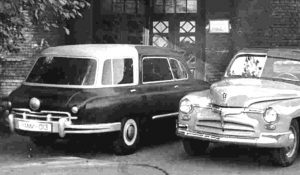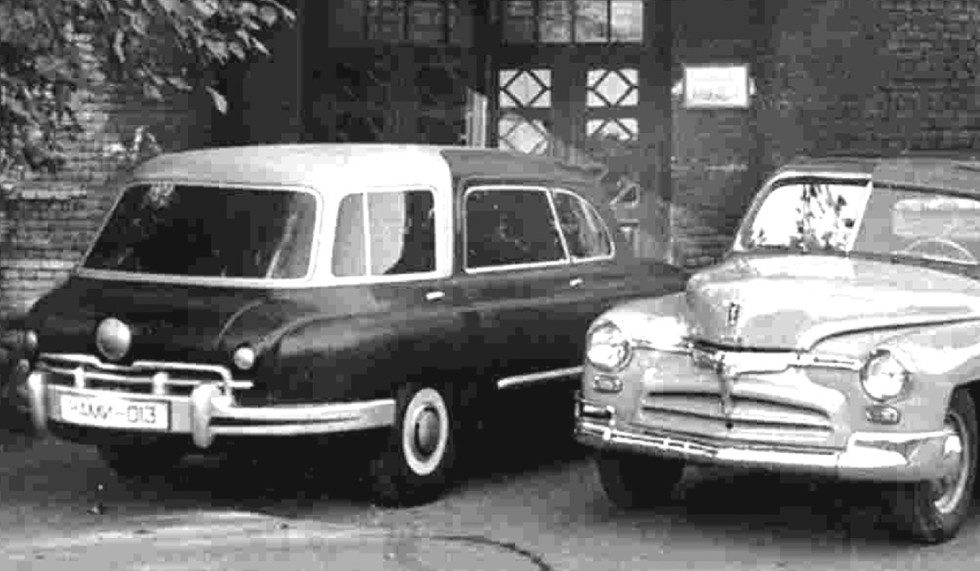Chita, Squirrel, Ant: Soviet rare cars, cars
 Yuri A. Dolmatovsky, Candidate of Technical Sciences, a talented engineer and artist, founder and theorist of the school of Soviet automobile design, a well-known writer, popularizer and journalist, was the main advocate of the wagon layout. A long time ago several generations of boys were brought up on the books and articles of Dolmatovsky, who tried to infuse us with his great passion for cars and support his “fellow mania”.
Yuri A. Dolmatovsky, Candidate of Technical Sciences, a talented engineer and artist, founder and theorist of the school of Soviet automobile design, a well-known writer, popularizer and journalist, was the main advocate of the wagon layout. A long time ago several generations of boys were brought up on the books and articles of Dolmatovsky, who tried to infuse us with his great passion for cars and support his “fellow mania”.
The birth and death of “Cheats”: the first Soviet car NAMI-013
Having completed the development of cargo bodies and trailed toilets, in 1949, Yuri Dolmatovsky, head of the bodywork bureau of the Scientific Automobile Institute (NAMI), began to fulfill his cherished dream – the creation of avant-garde car assemblies, which were then called trambuses. Thus was born the idea of a revolutionary car NAMI-013, which was developed by the engineer Konstantin Zeyvang and the artist-designer Vladimir Aryamov.
The sketch of Aryamov is a squat car with soft aerodynamic shapes and unusual proportions.
image45
Project Dolmatovsky – NAMI-013 with strict forms, massive bumpers and a pronounced rear engine compartment
Even before the birth of the future car in the US, there was controversy about the feasibility of the rear-engine scheme and the possibility of giving the car a beautiful shape. To imagine how it will be perceived in “natural conditions”, a NAMI-013 mock-up was built life-size, and to make it similar to the usual production cars, its body was painted with the silhouette of an ordinary hood machine, camouflaged with all the signs of rear engine placement.
Model of the car NAMI-013 with a drawn bonnet body “to assess the possibility of its operation”. 1949
The first unfinished version of NAMI-013 with a tubular farm instead of a body was ready in December 1950, but when it was overloaded, it collapsed on the ground, and then it took another year and a half to repair and refine it. During this time, we managed to assemble and remake three versions of the same car, which differed in the design of the body, the interior with three rows of seats for 6-7 people and the placement of the engine cooling system radiator.
The first version of NAMI-013 with characteristic round air intake holes
In 1951, the first version of the lifting body NAMI-013 was manufactured at the Institute’s pilot plant. In June 1952, it was fully staffed, and the following year the prototype was put to the test. His driver’s seat was moved forward and fit between the front wheel wells, and the power unit was located behind the wheelbase, which allowed the car to create a characteristic aerodynamic shape. The unusual streamlined body had doorways that entered the roof, but the upper door hinges were installed outside, and the side windows were made sliding.
On tests, the first version of the NAMI-013 with an aerodynamic body
image48
The second option NAMI-013 with side moldings and lightweight bumpers
In the rear compartment of NAMI-013 was an experienced NAMI-013-D4 engine with a power of 63.5 hp. with two carburetors, created on the basis of the motor from the passenger “Victory” and working with the first in the USSR experimental hydromechanical transmission NAMI-DK. In his memoirs, Dolmatovsky wrote: “She particularly touched us: she acted as if nothing had happened, despite all our worries and fears. We were very proud of her. ” But the search for a place for the radiator has become a serious problem. Again the word to Dolmatovsky: “Finally, we sawed it in half and put the two narrow halves into a massive buffer with an electric fan and dampers …”
The final third option NAMI-013 with two radiators inside the bumper
By car used independent suspension and diskless wheels with 13-inch tires. Its wheelbase was 2.4 meters, the maximum speed with full load – 113 km / h.
Layout of the main units and components on the third series NAMI-013 machine
The appearance of NAMI-013 coincided with the demonstration in the USSR of the American film “Tarzan”, in which a monkey named “Chita” was shot. Neighboring boys noticed the similarity with her unusual car with a wide “mouth” in the bumper, bulging headlights and sloping “forehead.” Since then, all the races were accompanied by shouts: “Guys, Chita goes!”. And soon this nickname took root.
The front of the third version really looked like a monkey’s muzzle Rear engine compartment with a modified Pobedovskiy engine
The main results of the tests related to the comparison of “Cheats” with the cars “Victory” and ZIM and in most cases turned out to be in favor of NAMI-013.
Comparative tests of NAMI-013 second version with representative car GAZ-12 ZIM
image57
Road tests of the latest version of NAMI-013 with the usual “Victory” M-20
And yet, much more important negative qualities turned out to be more: insufficient safety of the driver and front passenger, artisanal execution, too complicated transmission, high cost of an unusual “toy”, etc.





